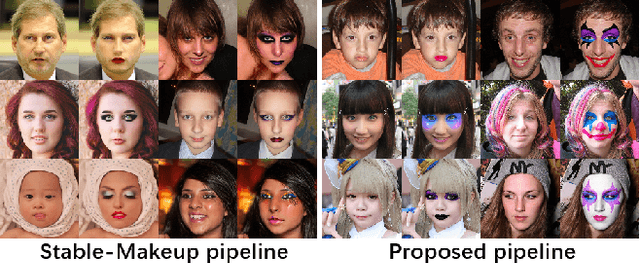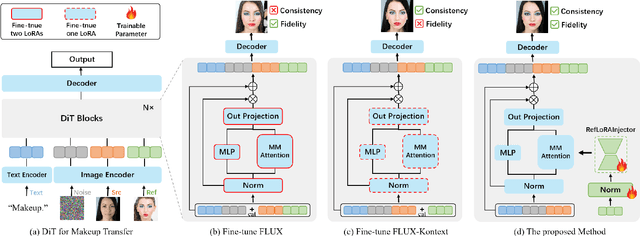Yue Gong
CTA-Flux: Integrating Chinese Cultural Semantics into High-Quality English Text-to-Image Communities
Aug 20, 2025Abstract:We proposed the Chinese Text Adapter-Flux (CTA-Flux). An adaptation method fits the Chinese text inputs to Flux, a powerful text-to-image (TTI) generative model initially trained on the English corpus. Despite the notable image generation ability conditioned on English text inputs, Flux performs poorly when processing non-English prompts, particularly due to linguistic and cultural biases inherent in predominantly English-centric training datasets. Existing approaches, such as translating non-English prompts into English or finetuning models for bilingual mappings, inadequately address culturally specific semantics, compromising image authenticity and quality. To address this issue, we introduce a novel method to bridge Chinese semantic understanding with compatibility in English-centric TTI model communities. Existing approaches relying on ControlNet-like architectures typically require a massive parameter scale and lack direct control over Chinese semantics. In comparison, CTA-flux leverages MultiModal Diffusion Transformer (MMDiT) to control the Flux backbone directly, significantly reducing the number of parameters while enhancing the model's understanding of Chinese semantics. This integration significantly improves the generation quality and cultural authenticity without extensive retraining of the entire model, thus maintaining compatibility with existing text-to-image plugins such as LoRA, IP-Adapter, and ControlNet. Empirical evaluations demonstrate that CTA-flux supports Chinese and English prompts and achieves superior image generation quality, visual realism, and faithful depiction of Chinese semantics.
NanoControl: A Lightweight Framework for Precise and Efficient Control in Diffusion Transformer
Aug 14, 2025Abstract:Diffusion Transformers (DiTs) have demonstrated exceptional capabilities in text-to-image synthesis. However, in the domain of controllable text-to-image generation using DiTs, most existing methods still rely on the ControlNet paradigm originally designed for UNet-based diffusion models. This paradigm introduces significant parameter overhead and increased computational costs. To address these challenges, we propose the Nano Control Diffusion Transformer (NanoControl), which employs Flux as the backbone network. Our model achieves state-of-the-art controllable text-to-image generation performance while incurring only a 0.024\% increase in parameter count and a 0.029\% increase in GFLOPs, thus enabling highly efficient controllable generation. Specifically, rather than duplicating the DiT backbone for control, we design a LoRA-style (low-rank adaptation) control module that directly learns control signals from raw conditioning inputs. Furthermore, we introduce a KV-Context Augmentation mechanism that integrates condition-specific key-value information into the backbone in a simple yet highly effective manner, facilitating deep fusion of conditional features. Extensive benchmark experiments demonstrate that NanoControl significantly reduces computational overhead compared to conventional control approaches, while maintaining superior generation quality and achieving improved controllability.
FLUX-Makeup: High-Fidelity, Identity-Consistent, and Robust Makeup Transfer via Diffusion Transformer
Aug 07, 2025



Abstract:Makeup transfer aims to apply the makeup style from a reference face to a target face and has been increasingly adopted in practical applications. Existing GAN-based approaches typically rely on carefully designed loss functions to balance transfer quality and facial identity consistency, while diffusion-based methods often depend on additional face-control modules or algorithms to preserve identity. However, these auxiliary components tend to introduce extra errors, leading to suboptimal transfer results. To overcome these limitations, we propose FLUX-Makeup, a high-fidelity, identity-consistent, and robust makeup transfer framework that eliminates the need for any auxiliary face-control components. Instead, our method directly leverages source-reference image pairs to achieve superior transfer performance. Specifically, we build our framework upon FLUX-Kontext, using the source image as its native conditional input. Furthermore, we introduce RefLoRAInjector, a lightweight makeup feature injector that decouples the reference pathway from the backbone, enabling efficient and comprehensive extraction of makeup-related information. In parallel, we design a robust and scalable data generation pipeline to provide more accurate supervision during training. The paired makeup datasets produced by this pipeline significantly surpass the quality of all existing datasets. Extensive experiments demonstrate that FLUX-Makeup achieves state-of-the-art performance, exhibiting strong robustness across diverse scenarios.
SQLens: An End-to-End Framework for Error Detection and Correction in Text-to-SQL
Jun 04, 2025Abstract:Text-to-SQL systems translate natural language (NL) questions into SQL queries, enabling non-technical users to interact with structured data. While large language models (LLMs) have shown promising results on the text-to-SQL task, they often produce semantically incorrect yet syntactically valid queries, with limited insight into their reliability. We propose SQLens, an end-to-end framework for fine-grained detection and correction of semantic errors in LLM-generated SQL. SQLens integrates error signals from both the underlying database and the LLM to identify potential semantic errors within SQL clauses. It further leverages these signals to guide query correction. Empirical results on two public benchmarks show that SQLens outperforms the best LLM-based self-evaluation method by 25.78% in F1 for error detection, and improves execution accuracy of out-of-the-box text-to-SQL systems by up to 20%.
Pneuma: Leveraging LLMs for Tabular Data Representation and Retrieval in an End-to-End System
Apr 12, 2025Abstract:Finding relevant tables among databases, lakes, and repositories is the first step in extracting value from data. Such a task remains difficult because assessing whether a table is relevant to a problem does not always depend only on its content but also on the context, which is usually tribal knowledge known to the individual or team. While tools like data catalogs and academic data discovery systems target this problem, they rely on keyword search or more complex interfaces, limiting non-technical users' ability to find relevant data. The advent of large language models (LLMs) offers a unique opportunity for users to ask questions directly in natural language, making dataset discovery more intuitive, accessible, and efficient. In this paper, we introduce Pneuma, a retrieval-augmented generation (RAG) system designed to efficiently and effectively discover tabular data. Pneuma leverages large language models (LLMs) for both table representation and table retrieval. For table representation, Pneuma preserves schema and row-level information to ensure comprehensive data understanding. For table retrieval, Pneuma augments LLMs with traditional information retrieval techniques, such as full-text and vector search, harnessing the strengths of both to improve retrieval performance. To evaluate Pneuma, we generate comprehensive benchmarks that simulate table discovery workload on six real-world datasets including enterprise data, scientific databases, warehousing data, and open data. Our results demonstrate that Pneuma outperforms widely used table search systems (such as full-text search and state-of-the-art RAG systems) in accuracy and resource efficiency.
DeepSeek-V3 Technical Report
Dec 27, 2024



Abstract:We present DeepSeek-V3, a strong Mixture-of-Experts (MoE) language model with 671B total parameters with 37B activated for each token. To achieve efficient inference and cost-effective training, DeepSeek-V3 adopts Multi-head Latent Attention (MLA) and DeepSeekMoE architectures, which were thoroughly validated in DeepSeek-V2. Furthermore, DeepSeek-V3 pioneers an auxiliary-loss-free strategy for load balancing and sets a multi-token prediction training objective for stronger performance. We pre-train DeepSeek-V3 on 14.8 trillion diverse and high-quality tokens, followed by Supervised Fine-Tuning and Reinforcement Learning stages to fully harness its capabilities. Comprehensive evaluations reveal that DeepSeek-V3 outperforms other open-source models and achieves performance comparable to leading closed-source models. Despite its excellent performance, DeepSeek-V3 requires only 2.788M H800 GPU hours for its full training. In addition, its training process is remarkably stable. Throughout the entire training process, we did not experience any irrecoverable loss spikes or perform any rollbacks. The model checkpoints are available at https://github.com/deepseek-ai/DeepSeek-V3.
A survey on deep learning approaches for data integration in autonomous driving system
Jun 17, 2023



Abstract:The perception module of self-driving vehicles relies on a multi-sensor system to understand its environment. Recent advancements in deep learning have led to the rapid development of approaches that integrate multi-sensory measurements to enhance perception capabilities. This paper surveys the latest deep learning integration techniques applied to the perception module in autonomous driving systems, categorizing integration approaches based on "what, how, and when to integrate." A new taxonomy of integration is proposed, based on three dimensions: multi-view, multi-modality, and multi-frame. The integration operations and their pros and cons are summarized, providing new insights into the properties of an "ideal" data integration approach that can alleviate the limitations of existing methods. After reviewing hundreds of relevant papers, this survey concludes with a discussion of the key features of an optimal data integration approach.
METAM: Goal-Oriented Data Discovery
Apr 18, 2023Abstract:Data is a central component of machine learning and causal inference tasks. The availability of large amounts of data from sources such as open data repositories, data lakes and data marketplaces creates an opportunity to augment data and boost those tasks' performance. However, augmentation techniques rely on a user manually discovering and shortlisting useful candidate augmentations. Existing solutions do not leverage the synergy between discovery and augmentation, thus under exploiting data. In this paper, we introduce METAM, a novel goal-oriented framework that queries the downstream task with a candidate dataset, forming a feedback loop that automatically steers the discovery and augmentation process. To select candidates efficiently, METAM leverages properties of the: i) data, ii) utility function, and iii) solution set size. We show METAM's theoretical guarantees and demonstrate those empirically on a broad set of tasks. All in all, we demonstrate the promise of goal-oriented data discovery to modern data science applications.
 Add to Chrome
Add to Chrome Add to Firefox
Add to Firefox Add to Edge
Add to Edge